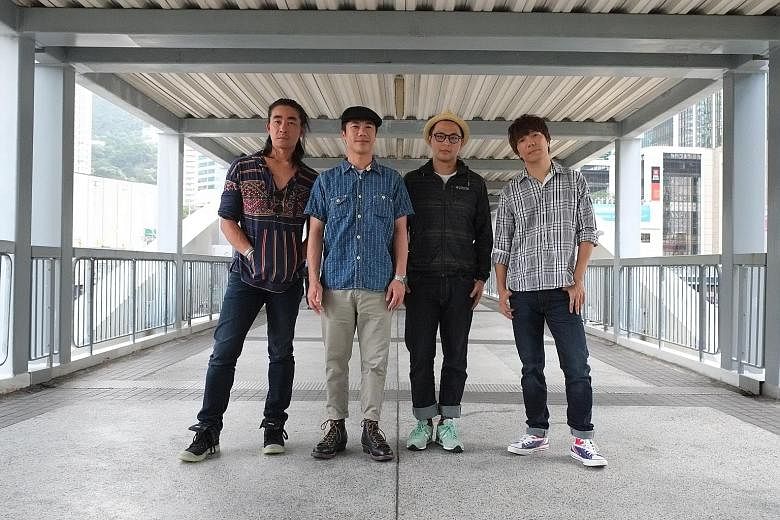Donald Tsang Please Die. Hostage. Police Tale. Beijing, North Point.
Songs with political and social messages - some gently woven in as an undertone, others unleashed with the force of wailing guitars - are emerging and gaining in popularity in Hong Kong's music scene.
As the city grapples with angst over its future, a new wave of artists, including in its mainstream Canto-pop industry, are writing and performing socially and politically conscious material.
Bands from the 1980s like Grasshopper are passe here. Instead, younger bands like RubberBand and My Little Airport are the ones with sold-out gigs and exciting chatter on social media.
It is not just the indie musicians plunging into the maelstrom. Pop singers such as "grassroots queen" Kay Tse, gay icon Anthony Wong, and Anita Mui protege Denise Ho have done so as well. A song by Tse, for example, called Egg And Lamb, heaves with rebellion: "Today the egg hits the wall. We're not shying from sacrifices. Or else we'd be bowing our heads to be a lamb, trapped in the farm forever."
Released in July last year, it was seen by many here as a call to arms before the Occupy movement agitating for greater freedoms from Beijing to elect Hong Kong's leader.
Others are more subtle and take on broader concerns. Khalil Fong sings about environmental issues in songs like Gotta Make A Change.
The creation of such music today is natural, given how socio-political issues are dominating headlines, said Web radio host Ng Tze Bun.
The current wave rides on two trends: frustration with the Hong Kong and Beijing governments over the city's political future and weak governance, coupled with a "return to basics" movement - whether it is to support local shops or even grow their own food, said Dr Wong Chi Chung, a pop music critic and deejay.
"Hong Kongers are thinking about their future, and this is reflected in the music," he said.
So, RubberBand, a Cantopop band signed with MediaAsia, sings about issues such as rising rentals and the loss of local culture. One of its newest songs, Hostage, was inspired by the young Occupy protesters whose parents locked the doors to prevent them from going to the protest sites, said drummer Lai Man Wang.
RubberBand's vocalist and lyricist Mau Hou Cheong said: "Society has changed. In the past, during the good times in Hong Kong, a lot of the music was about love, having fun. Now, we are still singing about love, but it's the love between us and society.
"We talk about the unfairness we see and hope to raise awareness."
Sometimes, it is done with a wink.
At a sold-out gig last month, young Hong Kongers thrilled to the whimsical music of My Little Airport, known for its hits such as the one pleading for Hong Kong's former chief executive's death after he suggested that people should move on from the 1989 Tiananmen Square incident, given China's economic progress. Mr Tsang later apologised for his comment.
Such politically themed music is not new to the city, often surfacing during times of turbulence, said Dr Wong, who also teaches about culture at the University of Hong Kong. The trailblazer was an underground band called Black Bird, which took flight in the 1980s amid negotiations over Hong Kong's 1997 handover.
Later, Cantonese rap group LMF, signed by Warner, packed the 12,000-seat Coliseum with its profanity-soaked music attacking the Tung Chee Hwa administration for its performance during the 2003 Asian crisis.
Such material, though, remained on the periphery. But today's wave has the potential to become "bigger" with the fragmentation of the music industry, said Dr Wong.
The days of major labels working with traditional media to promote mega stars are gone. With manufactured pop on the wane, there is "greater space for many different musicians doing different music".
Still, even idealistic artists need to eat. Singing about local politics and cha chaan teng (Hong Kong-style cafes) may appeal to some Hong Kongers but is limited in regional appeal.
And the largest market is the 1.4 billion mainland Chinese, whose government does not take kindly to subversive anti-authority content.
Also, most Hong Kongers still prefer to listen to music as "entertainment", said LMF's chief lyricist Chan Kwong Yan.
So even for some of the pop artists willing to push the envelope, there is "some kind of calculation" - a political song slipped in among the mix of ballads or coy metaphors used, Dr Wong acknowledged.
Said indie musician Ben Tse: "There are a few well-known bands who sing very clearly about social issues but choose to avoid topics like Occupy, democracy, June 4th, criticism of Chinese government because they don't want to be blacklisted from touring mainland China or offending major labels."
Within Hong Kong, however, it is music that appears to favour the establishment that tends to invite invective. Lyricist Wyman Wong had to apologise after his hit composition Beijing, North Point, sung by Hacken Lee, was criticised as political propaganda.
Its first line goes "Beijing, North Point, lovers together", and he had, he said, meant for it to promote harmony between Hong Kongers and mainland Chinese following a branding of mainland tourists as "locusts". But netizens saw it as an attempt to curry favour with the Chinese authorities.
Given the fevered atmosphere, it is unsurprising that RubberBand also has a song that strives to be upbeat in its message, called Gotta Go.
And while some might interpret that as Hong Kongers' disenchantment with the city or the Beijing leadership's frustration with it, Mr Mau said it is about "moving on from the current stagnant condition". "We don't use rifles to change society. Our weapon is our music," he added.

